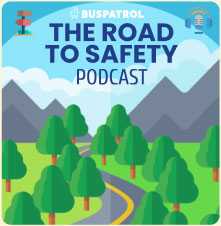Helping to enforce safe driving around school buses is a personal mission for the CEO of BusPatrol.
When discussing road safety, technology can sometimes get a bad rap: more often than not, drivers who are distracted by their smartphones become the target of fire. Rightfully so, but ensuring safer roads for students going to school is about learning to take the technology that so often distracts us and use it to our advantage.
For Jean Souliere, CEO of BusPatrol, that coexistence is simple but complex. A balancing act, of sorts.
“We’re educating a population, making the road safer, and tackling a very important problem: passing a school bus is a symptom of distracted driving, which has just recently overtaken all other causes of deaths on the road,” he says, “These cellphones, these smart tablets, these smartphones, all this technology that’s distracting us…how do we teach people to live with the technology that makes their lives easier without putting the people outside their vehicle at risk?”
For Souliere, an entrepreneur for over 10 years, that mission is a personal one borne from experience.
“I took the bus to school all the time, and I actually have some really great memories of taking the bus to school. Also, some not-so-great memories. Unfortunately, when I was going to school I was witness to an accident which marked me,” he reflects.
So how can technology help, not hinder, our road safety?
BusPatrol essentially installs a technological “backbone” inside a school bus. This includes a computer, cameras, telemetry, GPS, and a cellular modem. This allows BusPatrol to connect to the bus in real-time and track its location, while also recording outside action around the bus. License plates of cars that illegally pass are captured, and the clips get sent to the processing cloud as well as local law enforcement, who ultimately decide if a ticket is issued or not.
The cutting-edge technology BusPatrol uses is developed in New Orleans, with the business intelligence office located in Dallas and a processing unit in Virginia. All these units come together to offer a turnkey solution for tackling the problem of distracted drivers.
“We’re operating currently across six states in the United States and growing rapidly,” Souliere says, “It’s time-consuming, whether it be municipalities or government or transportation companies, to manage and maintain the technology we offer. So we actually take a lot of that investment out of their hands. We build out the evidence and deliver it to a police officer in the necessary jurisdiction. So whatever state they may be in, we serve up the data through our portal and the police officers then have to apply their judgment in order to determine whether a ticket should be issued… Once that police officer issues a ticket, then we take over again. We print out and mail the ticket, and send it to the offender. At which point the offender has the option through a link and a passcode that we give them to see the evidence against them online.”
“It really is an educational tool, it’s not simply a ticket in the mail where money is owed. We actually give the offender the opportunity to see exactly what they did that was wrong,” he says.
The amalgamation of coexisting with technology, working with your communities and local law enforcement, and educating the public on road safety will help put the brakes on distracted driving.


